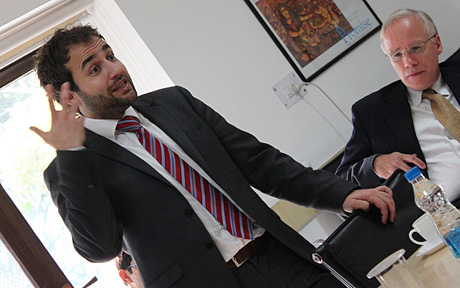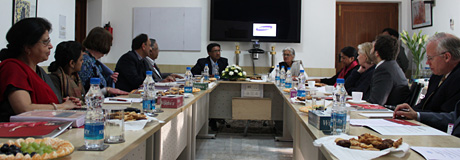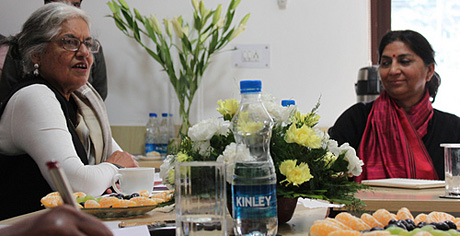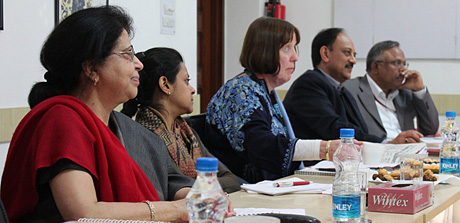The world is looking to India to ensure a safer place for women: Norway’s Deputy Minister for International Development
Date:
New Delhi, February 1 2013: UN Women organised a meeting between Norway’s Deputy Minister for International Development, Mr. Arvinn Gadgil and representatives from the Government of India, media and civil society to discuss issues that underpin gender inequality and discrimination against women. The focus was on preventing violence against women, given the spate of increasing violence against women and girls particularly the horrific gang-rape of 16 December, 2012 that has caught the world’s attention.

Mr. Arvinn Gadgil, Honorable Deputy Minister for International Development, Norway makes a point while His Excellency, Ambassador of Norway to India looks on. Photo Credit: UN Women/Sabrina Sidhu
Expressing Norway’s commitment towards ending violence against women, Mr. Arvinn Gadgil, Deputy Minister for International Development, Government of Norway said that violence against women is an impediment for development. Stating that Norway attaches great importance to ending violence against women he urged India to ‘take swift actions on the ground by prioritising the development agenda in an inclusive manner as the world is looking to India to ensure a safer place for women’.
UN Women works extensively to prevent violence against women in India. “Violence is an overarching challenge for realising the full potential of women in India. Progressive laws must be effectively implemented on the ground to eradicate social evils that perpetuate violence against women,” said Ms. Anne F Stenhammer, UN Women Representative for India, Bhutan, Maldives and Sri Lanka.

Setting the context, many urged that India should go beyond the symptoms and treat the cause. Photo Credit: UN Women/ Sabrina Sidhu
Dwelling on the tragic December 16 incident, Dr. G. Mohan Gopal, Director, Rajiv Gandhi Institute of Contemporary Studies said that these events are symptoms and the need of the hour is to tackle the cause. “For years working with the Dalit movement and justice movements, my feeling is that the social hierarchy of inequality which is entrenched in institutions and manifests in many different ways is the core problem,” said Dr Gopal.
He cited two good examples of legislation such as the Protection of Women from Domestic Violence and the Right to Information which were developed by the civil society. “Improving, deepening, building the quality of the law and its implementation is critical, ” he added.

Indira Jaising urges everyone to seize the moment. Photo Credit: UN Women/Sabrina Sidhu
Observing that the Justice Verma Committee Report presents opportunities in making the shift from non-discrimination towards equality, Ms. Indira Jaising, Additional Solicitor-General of India and Director, Lawyer’s Collective women Rights Initiative said: “ The Charter of Rights is the most potent tool in the Justice Verma Committee Report because women are not equal. What we do in India today is going to matter tomorrow. It’s a moment in the history of the country, which will not come again soon. We have to seize the moment.”

The meeting, which was organized by UN Women, brought forth solutions and ideas to make India safer for women. Photo Credit: UN Women/Sabrina sidhu
Mr. T. Vijay Kumar, Joint Secretary, Ministry of Rural Development and Mr. Rajiv Kale, Director, Department of Women and Child Development, Government of Delhi also spoke of the priorities of their respective offices in empowering women and appreciated Norway’s support in this regard.
Ms. Nandita Sengupta from the Times of India outlined the challenges of ensuring media coverage on gender and safety. Highlighting the need for media involvement, she said that the Justice Verma Committee Report presents “a road map for India in translating its commitment to make the world a better place for all”.
The Justice Verma Committee, headed by former Chief Justice of India, Justice J.S. Verma, had reviewed laws for sexual crimes and submitted its report to the government. Amongst its recommendations is a separate Bill of Rights for women that entitles a woman to a life of dignity and security.